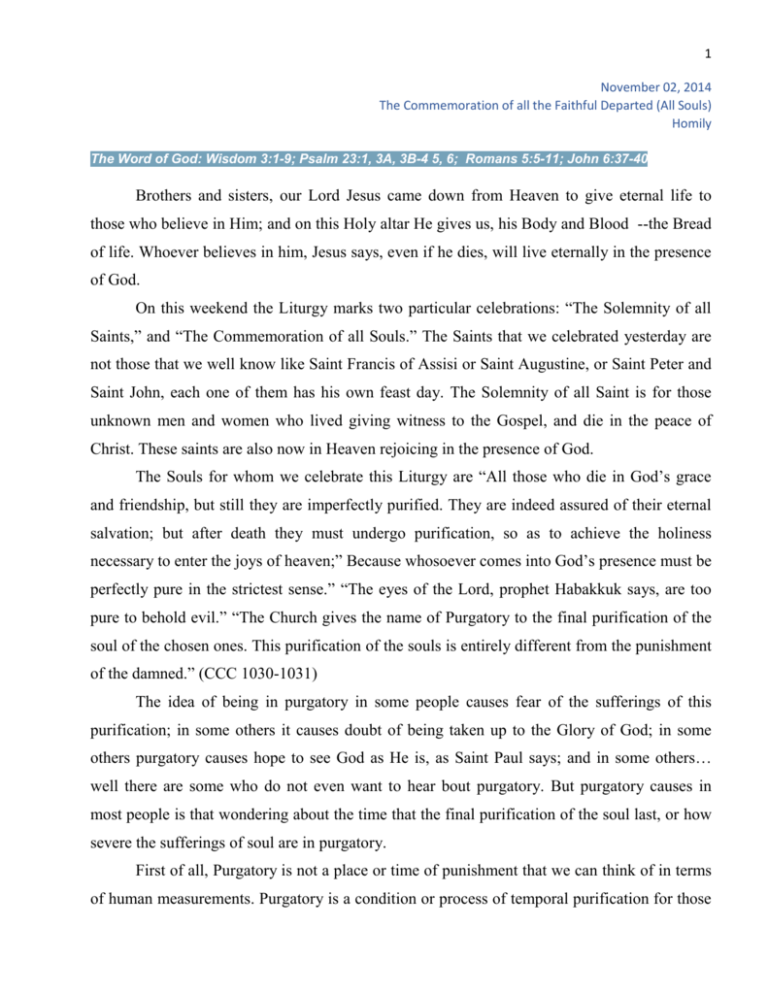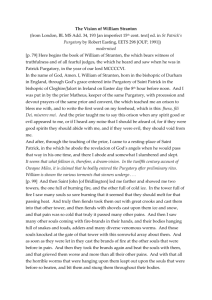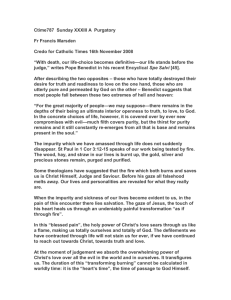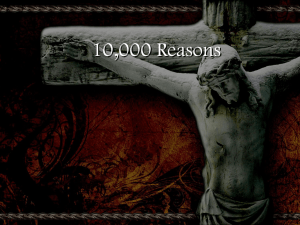gave a wonderful catechetical homily and I have asked our
advertisement

1 November 02, 2014 The Commemoration of all the Faithful Departed (All Souls) Homily The Word of God: Wisdom 3:1-9; Psalm 23:1, 3A, 3B-4 5, 6; Romans 5:5-11; John 6:37-40 Brothers and sisters, our Lord Jesus came down from Heaven to give eternal life to those who believe in Him; and on this Holy altar He gives us, his Body and Blood --the Bread of life. Whoever believes in him, Jesus says, even if he dies, will live eternally in the presence of God. On this weekend the Liturgy marks two particular celebrations: “The Solemnity of all Saints,” and “The Commemoration of all Souls.” The Saints that we celebrated yesterday are not those that we well know like Saint Francis of Assisi or Saint Augustine, or Saint Peter and Saint John, each one of them has his own feast day. The Solemnity of all Saint is for those unknown men and women who lived giving witness to the Gospel, and die in the peace of Christ. These saints are also now in Heaven rejoicing in the presence of God. The Souls for whom we celebrate this Liturgy are “All those who die in God’s grace and friendship, but still they are imperfectly purified. They are indeed assured of their eternal salvation; but after death they must undergo purification, so as to achieve the holiness necessary to enter the joys of heaven;” Because whosoever comes into God’s presence must be perfectly pure in the strictest sense.” “The eyes of the Lord, prophet Habakkuk says, are too pure to behold evil.” “The Church gives the name of Purgatory to the final purification of the soul of the chosen ones. This purification of the souls is entirely different from the punishment of the damned.” (CCC 1030-1031) The idea of being in purgatory in some people causes fear of the sufferings of this purification; in some others it causes doubt of being taken up to the Glory of God; in some others purgatory causes hope to see God as He is, as Saint Paul says; and in some others… well there are some who do not even want to hear bout purgatory. But purgatory causes in most people is that wondering about the time that the final purification of the soul last, or how severe the sufferings of soul are in purgatory. First of all, Purgatory is not a place or time of punishment that we can think of in terms of human measurements. Purgatory is a condition or process of temporal purification for those 2 who, departing this life in God’s grace, are, not entirely free from venial faults, or have not fully paid the satisfaction due to their transgressions. At the Council of Florence (in 1031) and the Council of Trent (in 1563) the fathers of the Church declared that, “The Catholic Church, instructed by the Holy Spirit, has, from the Sacred Scripture and the ancient tradition, taught that there is a purgatory, --yes, there is purgatory-- and that the souls therein are helped by the prayers of the faithful, and especially by the acceptable Sacrifice of the Altar.” Many have the idea of fire in purgatory to punish the souls, and therefore they are afraid of purgatory. But flames and fire, however, was a common symbol of purification and cleansing in the Holy Bible. The First Reading, for example, tells us that the Lord God proves the just ones through fire, and finding them worthy “He takes them to himself.” In Old Testament times, fire was also a symbol of the presence of God. It was in the Burning Bush, for example, that the Lord God talked to Mosses. And fire is frequently associated with the Holy Spirit, particularly on his coming upon the Apostle at Pentecost. So, if there is fire in purgatory, as the fathers of the Church argue, this is a cleansing and purifying fire; purifying fire in terms of God’s love, says Pope Benedict XVI. Purgatory, says the Pope, is a transforming burning moment of the soul into God’s love; because whosoever comes into God’s presence must be perfectly pure; because of the eyes of the Lord God are too pure to see an impure soul. Now, how painful is this purification? The Fathers of the Church and several saints agree that the sufferings in purgatory cannot be compared with any of the sufferings we might experience on earth. To the question, are the sufferings of the soul in purgatory more severe? The answer is yes, they are more severe; because these are the sufferings of the soul. In Saint Mathew’s Gospel Jesus says, “Don’t be afraid of those who want to kill your body but cannot touch your soul.” Nothing and no one on earth can even touch your soul, except yourself with your sins. In purgatory, however you are just soul, there is no body. So the sufferings touch the soul. But in fact, there is only one suffering; but this one means everything, everything that the souls desire and long for, but they do not yet have: God. The pain of the souls is to be temporally separated from the One who created it, and created it for himself; the One who is the object of its longing: God. In purgatory the only desire of the souls is to be in the presence 3 of God. What else can the soul desire? At this point remember the words of Saint Augustine, “Our heart is restless until it rests in You, oh Lord.” Until then the soul greatly suffers. The Catechism of the Catholic Church says, “The souls in purgatory are indeed assured of their eternal salvation.” Some people refer to the soul in purgatory as “The Holy Souls,” because they cannot longer sin. So that assurance of salvation is already a great joy for the souls; but it is precisely the cause of their suffering for not yet having that salvation. The conciliar fathers said that the souls in purgatory can be helped by the prayers of the faithful, and especially by the Holy Eucharist offered to God so that they may be taken up into the Glory of Heaven. In Old Testament times, according to the Book of Maccabees, Judas, the commander of the Israelite army sent twelve thousand drachmas of silver to Jerusalem to offer sacrifices for the sins of the dead. Judas believed that those who died with godliness, had great grace laid up for them. Tertullian, one of the Fathers of the Church in the II century, advises a widow to pray for the soul of her husband, begging repose for him and participation in the resurrection of Christ. Tertullian also commands that widow to make oblations for her husband on the anniversary of his death, and charges her with infidelity if she neglects to succor his soul. And Saint John Chrysostom reminds us of the sacrifices of Job saying, “If Job’s sons were purified by their father’s sacrifice, why should we doubt that our offerings for the dead would bring them same consolation? Saint Theresa of the Child Jesus said that the sufferings in purgatory are avoidable for those souls who totally surrender themselves to God. For example, Most Blessed Virgin Mary, who, at the annunciation of God’s plan of salvation by the Angel, said, “Ecce ancilla Domini, fiat mihi secundum Verbum tuum” --Behold I am the handmaid of the Lord, let it be to me according to your word.” And from that very moment, Mary consecrated totally herself to the Mystery of her Son, the Son of God. And because of Mary’s faith and faithfulness to the Mystery of Christ Jesus, her Son, She was taken up, Body and Soul, into the joys of Heaven; without passing through purgatory. Because of the lives of our faithful departed are not even close to the life of Mary Most Holy, as Saint John Chrysostom recommends, let us not hesitate to help those who have died, and to offer our prayers for the salvation of their souls.







